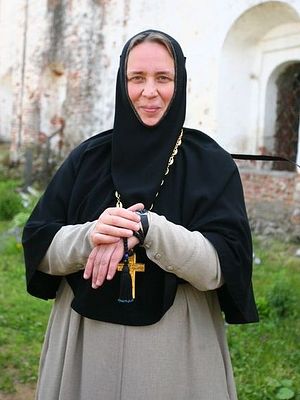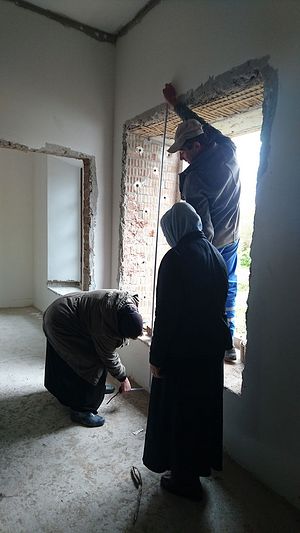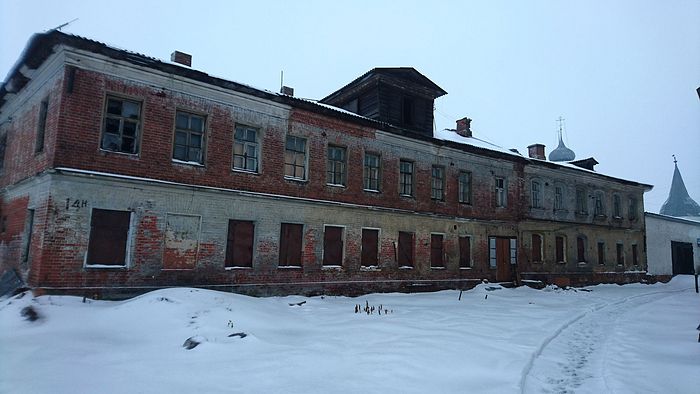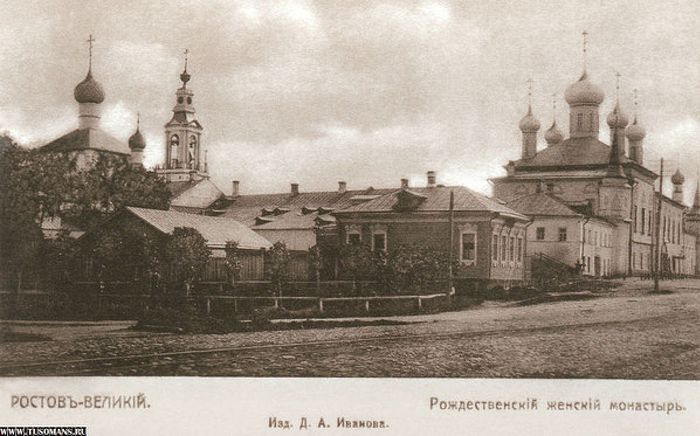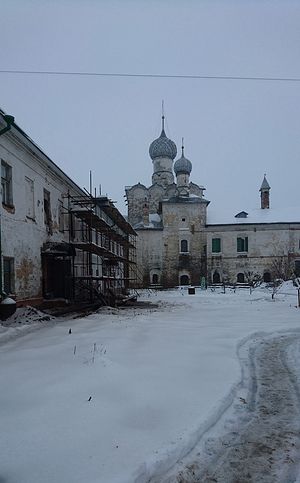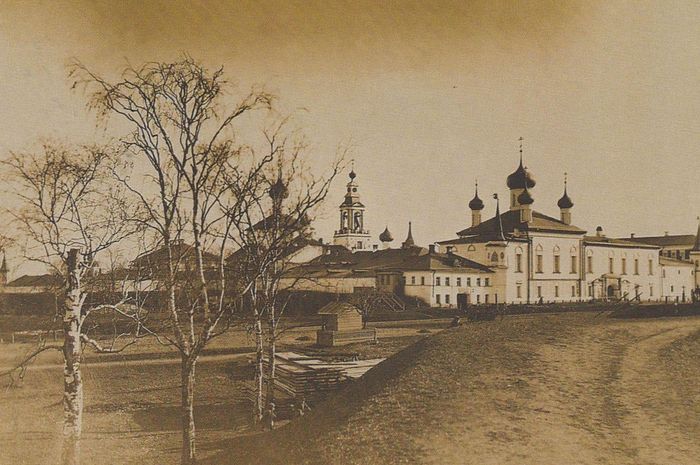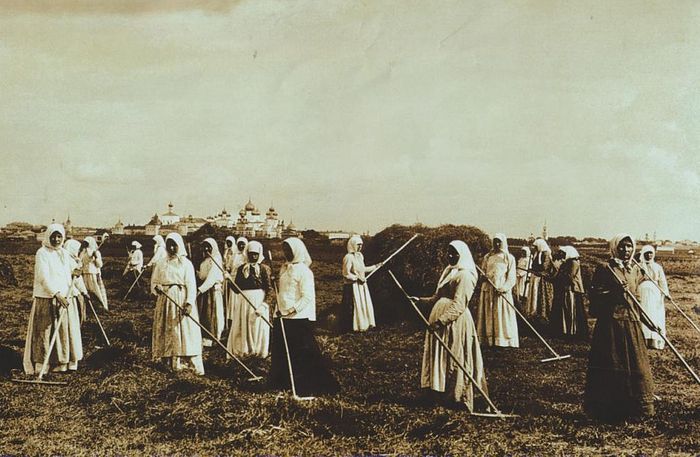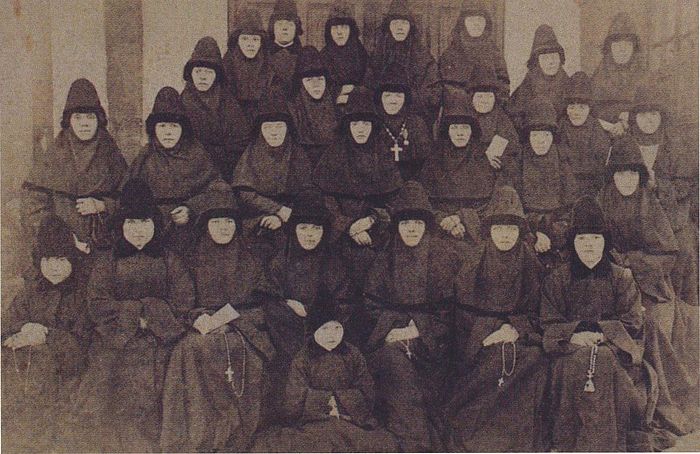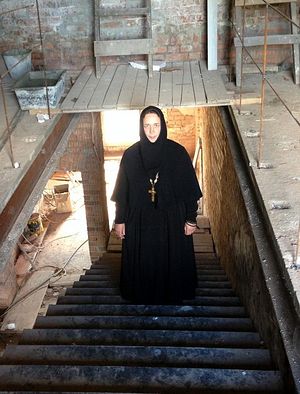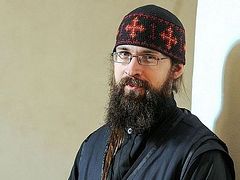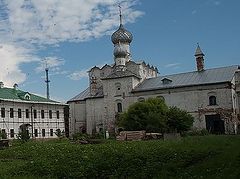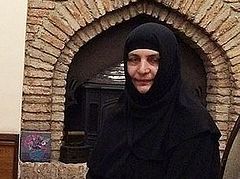Not long ago we acquainted the readers of OrthoChristian.com with the Convent of the Nativity of the Mother of God in Rostov Veliky (an ancient picturesque town of the Yaroslavl region, Central Russia), which is in a ruinous state. Abbess Athanasia (Silkina) of this convent expresses her sincere gratitude to all the generous benefactors who have responded to the application for aid to the old convent’s churches. It is gratifying to know that the restoration of the Church of the Tikhvin icon of Holy Theotokos commenced in the 110th anniversary year of the celebration of the Divine Liturgy in it by St. Tikhon (Belavin), who served as Archbishop of Yaroslavl and Rostov between 1907 and 1913 and in 1917 became the eleventh Patriarch of Moscow and All Russia.
At the time of the preparation for the radiant feast of the Nativity of Christ we talked with Mother Athanasia, abbess of this convent, and the main subject of our talk was, “what brings us closer to the Lord”.
—Until very recently our society with one voice has encouraged the restoration of destroyed holy monasteries and convents. Some saw the spiritual revival of Russia in it, others saw a possibility to labor for the glory of God, and others understood it as Christ’s calling to forsake all and follow Him. But now there is a debate: some argue that today there are perhaps too many monasteries and convents and doubt if we really need all of them in our times. Mother Athanasia, what would you reply to those who ask this question?
—Nowadays monasteries and convents are as relevant as they were in ancient times, if not more. These places are filled with the Divine grace. They are essential for people, so that driven and tossed by all kinds of winds in the turbulent sea of life, they might have such islands where they will find Divine grace and support.
For example, many people who come to our convent admit, “How strange! Even the air at your convent is somehow different!” It would seem that this phenomenon contradicts the laws of physics. The gases that make up the air we breathe mix, and there is the same town life with its vanity beyond the walls of our convent. But however restless a soul may be, it always finds consolation and healing at a monastery or convent. You will never hear swearing or foul language here. The aim of virtually every word here is the salvation of the soul. The life of a monastic community is focused on one thing—communion with God in prayer. Every word of praise, every act of thanksgiving or supplication makes the Lord pour out His mercies on us, and this blessing covers all who enter a monastery or convent.
—Then why is there no all-round support for the restoration of churches and monasteries on a national level?
—Perhaps you don’t mean that there is no “support”, but that from an outsider’s point of view churches and monasteries are not being restored at a fast pace. Emphasis is usually put on this aspect. As for people’s support, we always feel it. Sometimes help comes at the very moment when we lose all hope. I know it from the experience of our convent.
The Lord directs human hearts and He inspires them to perform good works. But for what purpose? Not for the rebuilding of brick walls and stone structures. As the Builder of the universe the Lord has His own design. A particular spiritual realm is being built of our souls. We, like bricks, are its elements. And for making the bond and the “brick masonry” stronger the Almighty unites us by means of some activity. When we restore holy shrines, we come in contact with each other and interact. We worry together, build together, and rejoice together. Very often in the process of this good work, the paths of absolutely different people cross, which would have otherwise been impossible. It greatly expands everybody’s spiritual horizons!
In my view, the pace of the restoration of a church or a monastery depends on how many people are involved in this project for the salvation of their souls, according to the plan of God. I believe that if the progress is very speedy, then only a few people will participate in the project. But the Lord wants to save as many souls as possible!
—The convent was transferred to the Russian Orthodox Church in 1997, but at that time only fragments of frescoes in the ruined cathedrals were a reminder of the holy monastery that had been founded in the late fourteenth century by St. Theodore, a nephew and close disciple of St. Sergius of Radonezh. All was in utter desolation. It is very hard to imagine all the trials and tribulations that the nuns had to go through in order to revive the atmosphere of prayer in this space.
—It is almost impossible and even unnecessary for me to comment on the period before my arrival to the convent in 2011. I understand the most important thing: The Lord has given me an opportunity to use all my abilities, skills and energy in order to restore this unique convent for His glory. I thank God for having this opportunity. It is the inexhaustible mercy of God if He has deemed you worthy to serve Christ all your life! What else can any monk or nun dream of?
—Mother Athanasia, do you remember your first reaction, feelings and thoughts you had at the sight of the convent that was entrusted to you?
—I realized that I needed to start from scratch to restore the convent. It was very interesting: I was going to “lay out a garden” in my new home. I became aware that it was a great responsibility, that I would need to have a wise approach to making decisions and to tackle several problems and tasks at the same time. I also became conscious that I had been brought there by Divine providence, that I would not be able to succeed in anything here without the help of God, and that He would certainly help me in my labors. And I felt that I should not be afraid despite any circumstances—the Lord was showing me that He was very close. And over these six years I have thanked the Creator for every day.
—Could you possibly tell us what you have managed to do over these six years?
—Over these years we have managed to do things that I couldn’t have dreamed of doing when crossing the convent’s threshold. And now, looking back at the past years, I cannot help but marvel at the Lord’s help! We have succeeded in registering the land as the convent’s property together with the whole building complex (though the buildings are still in a state of emergency). With the help of God we have water supply pipes and a local drainage system installed, the gas line has been laid, the design documentation has been executed, expert examination has been made, and the restoration of the living quarters has begun. We have already strengthened the foundations, replaced the decrepit roof, and repaired the entrance to one of the living quarters. Currently the Church of the Tikhvin icon is under restoration. I will not mention here such work as clearing the territory from heaps of trash and debris, scrap bricks, burdock, putting the things in order and the development of the territory.
But looking ahead, I see that we must do an enormous amount of work in order to restore the convent’s lost spiritual and missionary importance.
—What are your current priorities?
—Of course, we should renovate the nuns’ living quarters so that the sisters can live in them. Beyond all doubt, we need a functioning church on our territory. There are two churches on the convent’s territory, but they are in such a disastrous state that services cannot be celebrated in them. This is our main trouble! We go to services at the St. Nicholas Church attached to our convent, situated across the street outside the nunnery gates. It is a fantastic, beautiful, ancient church; however, we want our convent’s heart to beat within its “body”, and we want the Divine Liturgy to be celebrated on its territory. Of course, we plan to open the convent for pilgrims sooner or later, but in order to organize this we must repair other living quarters. After all, you have to receive, feed and accommodate your pilgrims. Surely by that time the community will have received new pious, zealous nuns—a very important but difficult task in itself.
—What are the main sources of the convent’s income? Are there situations when you cannot pay the bills?
—Yes, we constantly find ourselves in this situation. And we lack resources all the time. We are wondering whether we will manage to make ends meet in these circumstances permanently. And at the most critical moments we see that the Lord is near. He doesn’t abandon us and disposes other people to help our convent. And His help comes through people. It is chiefly through the flow of donations that come from various corners of the country and join our general “stream”, thus helping us to survive, pray, labor, act, hold on to and restore our convent.
—Mother Athanasia, we are very glad to hear that you are receiving support, given the modest earnings of most of Russians. There is a unique situation in Russia nowadays where millions of people live below the poverty line despite having paid jobs! In this context, some deplore the fact that their contributions for the restoration of holy monasteries are too modest, whereas others argue that those who made their fortunes on Russia’s natural resources must donate to churches and monasteries first of all. What would be wise for those who live in reduced circumstances?
—“I won’t donate because I am poor myself”—these words are usually caused by envy. Absolutely anyone can do his bit. Yes, your mite may be tiny from a worldly perspective, but it is many times greater than that offered out of abundance. Take note of how Christ valued the widow’s mite! He said that the poor widow put more into the offering box than all the others! Therefore, those who are unable to contribute large sums shouldn’t be sad. Let everyone contribute as much as he can, and the Lord will assess his charity at its true value. The worth of a contribution depends not on a specific sum of money, but on the purity of a donor’s intentions: whether it is given as disinterested aid, or a noble impulse or is mixed with arrogance. God alone knows the true intent of the heart and it is He Who sees any donation in its right perspective.
True, it often comes to pass that a person is limited by circumstances and he worries because he wants to donate more than he can. But I know by experience that the Savior covers these people with His grace, their lives return to normal, and their families avoid all difficulties and miseries. People in hopeless, straitened circumstances miraculously find solutions to their problems. So, one can withstand the storms of life even on a small boat, while huge vessels can shipwreck.
—There are examples how old women in remote dying villages miraculously restored churches with their very modest pensions and these villages were brought back to life. It was the way they expressed their love for God and rejoiced at being able to openly confess their Orthodox faith. But would it be right to wait for a reward for your charitable activities? “I will now perform many good deeds and will thus deserve my happiness!” Isn’t it a crafty trick?
—If somebody sincerely desires to keep the commandments of God, it by no means can be called “a crafty trick”.
And thou shalt love the Lord thy God with all thy heart, and with all thy soul, and with all thy mind, and with all thy strength: this is the first commandment (Mk. 12:30). If somebody contributes to the restoration and flourishing of a place where the Eucharist is performed and God is especially glorified, then he fulfils the commandment of love for God. Can it be described as “a sly intention” then?
As for the second commandment, the entire law can be summed up in it, Thou shalt love thy neighbour as thyself (Mk. 12:31). And our neighbor is someone for whom we do a favor, someone for whom we sacrifice our personal interests, as was the case with the Good Samaritan. If we have such people around us, then we have our neighbors through whom Christian love springs from our hearts. It won’t be possible to love God without love for our neighbors. The apostle John warned us about it saying, …For he that loveth not his brother whom he hath seen, how can he love God Whom he hath not seen? (1 Jn. 4:20). And if we don’t love God, our salvation is impossible.
It is our duty to help orphans, the elderly, the disabled, the sick, the homeless and the needy. We must do all of this as servants of God. The Gospel mentions all works of mercy we are supposed to perform in order to be justified at the Last Judgment and be found worthy of the Heavenly Kingdom: to feed the hungry, to give drink to the thirsty, to shelter the traveler, to clothe the naked, to comfort the sick, to visit the prisoner. And we are commanded to do all of this for our own good. According to Christ Himself, he who has failed to fulfil the law of love will realize his loss at the Final Judgment, Inasmuch as ye did it not to one of the least of these, ye did it not to Me (Mt. 25:45).
Therefore, he who does good and believes that the Lord will comfort him is right, for Blessed are the merciful: for they shall obtain mercy (Mt. 5:7).
—What other ways can people help your convent, in addition to financial support?
—We have this kind of experience. When we were participating in an Orthodox exhibition fair with our hand-made products for the first time, some women approached us and asked: “Do you happen to need pieces and scraps of cloth, fittings, yarn?” They had been keeping all these things for a long time in good condition but hadn’t been using them for some reason. We thankfully accepted what they offered. Using these materials and cloth, we sewed the things that were sought after: clothes, household stuff, etc. Then we brought our production to the following exhibition fair and these goods were in high demand! Our products are hand-made and they are prepared with love and prayer. Isn’t it a paradox? People have donated the cloths and yarn to the nunnery as they did not need them. And this cloth and yarn contributed to the convent’s restoration! It means that these people are potentially involved in the revival of the nunnery as well!
Many of our friends have been assisting us by laboring here. Sometimes we have a great deal of work which requires manual labor. At times we are in need of intellectual resources. For instance, our convent had no website, but good people turned up who created it and since then have been updating it and telling the world outside about our community. Thanks to them an increasing number of people have been discovering this convent!
—At present the accounts of a number of former novice monks and nuns are circulating on the internet, and they do not at all paint a rosy picture of life in modern monasteries. Obviously these stories are far from the truth, yet they are capable of discouraging lay-people from helping monasteries and convents. Is there anything to worry about here?
—Nothing can stop the people who sincerely want to make a donation to a church or a monastery, provided that is their heart’s desire. What is the population of our planet?
—Around 7.5 billion people.
—So imagine: 7.5 billion human souls. And all of them are different: their aspirations, desires, and worldviews vary. And if one of these 7.5 billion individuals claims that he has not been able to find his place at a monastery and if he is joined by a dozen of like-minded persons, will it prevent people of good will from performing acts of charity? These people are well aware that at least 100,000 of their brothers and sisters in Christ have found their place in monasteries (even though there are not billions of them). So, firstly, I am of opinion that he who claims that stories like these make him change his mind and stop supporting monasteries is just using it as an excuse.
Secondly, why do some leave monasteries and convents and fail to become real monks and nuns, as you say? Well, it probably means that they are not predisposed towards monastic life in the first place. For example, not all are able to handle military service. But of those who do manage military service only a few will become “lifers”. Furthermore, even of the few who remain to serve in the army, not all will opt for special service units. Finding a suitable niche in life depends on the level of one’s training. But if someone has served one year in the army and then started denouncing its special service unit only because the compulsory physical exercises and training were beyond his strength, it is “a horse of a different color”. Thus, using his weakness as an excuse, he will “sling mud” at special mission unit soldiers (or special squad officers) and set other people against them. Meanwhile we should thank those unites for ensuring public security; these people have the highest level of military, physical training and psychological preparation and are ready to take prompt action to protect us in extreme situations at any moment.
—Mother Athanasia, it is also said, He that walketh with wise men shall be wise (Prov. 13:20), and With the merciful thou wilt shew thyself merciful; with an upright man thou wilt shew thyself upright (Ps. 18:25 KJV). If somebody comes to a monastery or convent “by chance”, won’t its special, spiritual atmosphere have an effect on his soul? Won’t his heart be filled with Christ’s love that reigns all over its territory?
—There is a saying: “If you put a cucumber in brine, it will soak up its flavor sooner or later”. This is more or less the expected result you are speaking about. But this conclusion is not well grounded as regards human beings. First of all, we know that people have free will. Therefore, anybody will be able to act according to his free will regardless of his environment, whether it be in the world or at a monastery. We are supposed to fulfil God’s will irrespective of our environment. However, there are people who are not ready to impose restrictions on their free will anywhere: they do it neither in their families, nor at work, nor in public places, nor in monasteries. Wherever they are, they rebel, criticize, get annoyed, and make themselves and those around them feel frustrated. What can we say here? Obstinate people will feel terrible everywhere!
—Mother Athanasia, today there are lots of popular psychological training programs and books that teach people to love themselves above all. They interpret kindness as weakness of nature, altruism, as a mental disorder, and aid to the poor and the sick as a threat to one’s own well being. They recommend: “This is their lot. So you’d better keep away from them, otherwise their problems will become yours!”
—Yes, maybe this is “their lot”; but, firstly, every person is given a cross to bear in this world. No one has his cross “by chance”. And God does not give us more than we can bear. For some, bearing their cross means enduring their illness, whereas for others it means being with them, “bearing their burdens” and relieving their suffering. All of us should remember the wise words of Apostle Paul, Bear ye one another's burdens, and so fulfil the law of Christ (Gal. 6:2).
Secondly, when it comes to love, let us refer to the primary source—the Holy Scriptures and the commandments of the Lord. For whatever one or another person might say (even if he is recognized the wisest man in the world), he is just a mortal man. Sooner or later he will appear before the judgment seat of Christ. It is then that his deeds, thoughts and worldview will be exposed: whether or not he really spread the truth in the world. Let us obey the commandments of love, given us by our Savior, while we are still alive. We were given the commandments of love for God and for neighbor, but not for ourselves. Let those who proclaim love for themselves think about it more seriously.
So what does, “You shall love your neighbor as yourself,” mean? It means that we must love each other in the same way that we love ourselves. If somebody says, “I love myself so much!” then it is a healthy attitude, provided he pours the same love into others. Love yourself the way you love other people. That will be the only right attitude.
Our life on earth has its end. All people will have to die. We need to find time to fill ourselves up with love in order to abide with God in eternity. Thus we once again come to this conclusion: charity, mercy and compassion are the fulfilment of the commandments of the Lord, the reflection of our love for God and people.
And, in contrast to this, he who claims that he loves only himself and is indifferent to the problems of others is potentially capable of anything. If we look through police reports, we will get additional evidence that these people are guided by their personal, egotistic interests.
—It has always seemed to me that these egotists don’t love themselves. They are unhappy. They seem to have lost something, but they don’t know themselves what they have lost; they keep trying to make the word “eternity” out of the fragments of ice, but they fail over and over again. We are sorry for them… Mother Athanasia, maybe each egotist needs to find the self-sacrificing girl named Gerda [a major character of Hans Christian Andersen’s fairy tale The Snow Queen] to sing to him about Christ and restore what was lost?
—St. Ignatius (Brianchaninov) wrote, “In order to love our neighbors as ourselves we first need to love ourselves properly.” He explained, “A proper love for ourselves is keeping the life-giving commandments of Christ.”
He who truly loves himself values his life as a gift from God, will do his best to turn from a slave of passions into a servant of God, and take care to purify his soul, and fulfil the will of the Almighty. By saving himself he will contribute to the salvation of many souls around him.
Of course, egotists are far from having the right love. They mistake indulgence in their own desires, whims, passions (coupled with their egos—the sense of their own worth) for love; thus they lead themselves to degradation. St. Ignatius (Brianchaninov) wrote that if we measure the evil done to somebody in his life, then we will find that the most brutal enemy would not do to him as much evil as the person would do to himself. And, if we are honest with ourselves, it appears many people hate themselves!
Are there any ways we can help egotists? The Lord through His mercy will not abandon them and won’t take away His help from them. As a rule, if a person is self-obsessed, he will sooner or later find himself in a very difficult life situation. Only then will he begin to feel his loneliness and the bitterness of the vacuum he created around himself. The grace of God comes to him through his tears of repentance. The Savior will be merciful to him, forgive him his mistakes and send him kind-hearted people to support him. From then on he will feel warmth, and his soul will be transformed. This is something that happens very often. But does one really need to come to a state like this in order to transform his soul?
—Should we look for opportunities to help others ourselves?
—Some seek such opportunities; as for others, the Lord brings them to such situations when helping someone else becomes their life’s work. Different people have different life paths and stories.
But, as a matter of fact, we are surrounded by various situations when we can offer our aid. And wherever we are, there are people near us who need our attention and care. It is good that charitable traditions are being revived and a wide variety of public initiatives are appearing. Good works walk ahead of men. And when they depart this life, their good works will nevertheless remind the living about them. We still remember the names of those who founded monasteries and churches, opened hospitals, orphanages, schools and universities.
—If people want to help churches, the elderly, children, animal shelters and another good cause at the same time, then what should they do? Should they opt for just one or help all of them a little?
—In my view, it is something to think about for every individual person. True, if someone applies much energy to his cause, he expects certain results for his soul. So he ought to act on this basis.
As for the restoration of churches and monasteries, it is not a sphere of activity; rather, it is the expression of our love for God and the fulfilment of the principal commandment. Who blesses and supports people in their good works? Who provides them with all the necessary resources? Of course, you can say that it is industriousness, strong character and abilities that help people to earn money, be active, give joy to others, etc. And these are the words of the Lord, Without me ye can do nothing (Jn. 15:5). Let us imagine what people can do without intellect, talent, hands and legs? All that we have—skills, talents, knowledge, inspirations—is the Lord’s gift to us. We don’t even belong to ourselves—rather, we belong to God!
—Indeed we live in a favorable time when people of different ages and social standings unite in order to do good works through their joint efforts (including both complex and targeted support). Can you tell us what brings all these brothers and sisters together? What do those who are helping the Convent of the Nativity of Holy Theotokos have in common?
—Everyone is made differently. And all souls are different. At the moment when you are doing good to someone else, a feeling of love for that person arises inside you. And this feeling is central here. You can sacrifice absolutely nothing without love. It is impossible to sacrifice anything, if some kind of love had not been born in your heart before then. Once you begin to sacrifice, this wonderful feeling begins to grow inside you. Part of your heart remains with the good cause, with the person you became devoted to. Love is impossible without sacrifice. Likewise, a sacrifice is always accompanied by love. Through this you comprehend the true meaning of life and restore the bond of communion with God. After that, such ineffable bliss and peace of mind begin to reign in your heart that you are afraid to lose them.
We should always bear in mind the supreme love and sacrifice of our Lord and Savior Jesus Christ. He suffered on the Cross out of His Divine love. It was done out of the love for sinful, fallen mankind in order to deliver it from the power of devil and sin.

